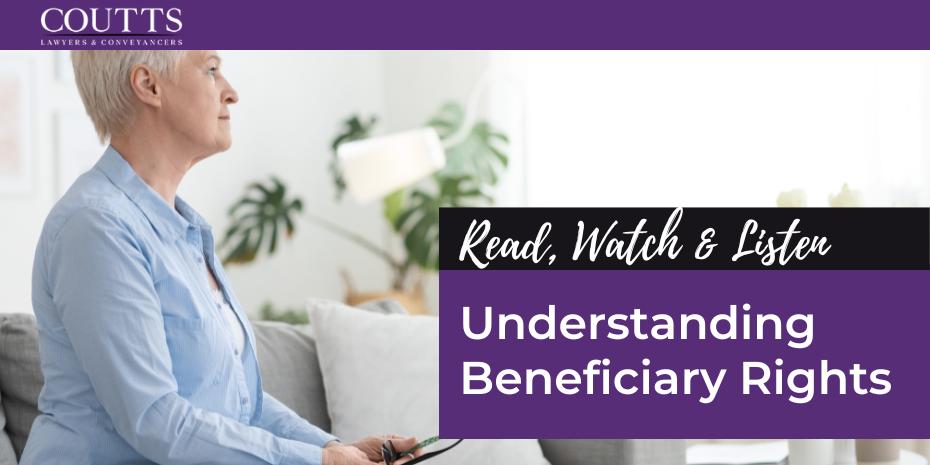We’ve Got You Covered
Our Elder Law services are dedicated to addressing the unique legal needs of older adults. Our team offers specialised guidance on issues such as estate planning, wills, powers of attorney, guardianship, and healthcare planning. We understand the importance of ensuring the rights and well-being of the elderly are protected, and we provide empathetic and comprehensive legal support to help them plan for their future.

Kaisha Gambell
Senior Associate
Step 1: Talk To Us
Reach out to Coutts Lawyers via our website, phone, or in person for a consultation on how we can help you secure your future.
Step 2: Consultation Appointment
Schedule and attend a meeting with a Coutts lawyer to discuss the specifics of your Estate matter and desired outcomes.
Step 3: We get to work
Rest assured, we’ll meticulously take care of all the legalities and processes involved in your Estate matter.
Book Your Elder Law Consultation Now
Elder Law
Elder law specifically looks to the protection of the aging population of Australia. Elder law focuses on ensuring the rights and responsibilities of the elderly are adequately protected and continually reviewed. In this way, Elder Law allows for legal issues to be highlighted and rectified to ensure health care, estate planning and elder abuse remain at the forefront of Australian issues.
Our elderly community has the right to be treated with dignity and respect and be able to make their own decisions and choices. They have the right to live in a safe environment and access the protections available to them in the community.
Elder Law commonly involves:
- Estate planning for the elderly person.
- Capacity concerns affecting the decision-making ability of the elderly person.
- Advice relating to disputes, abuse or discrimination to the elderly person.
- Financial abuse committed on the elderly person.
Our Wills & Estates Team are passionate about ensuring our elderly clients are well looked after as they grow older. We work together with financial planners, accountants and medical practitioners so that our clients are able to maintain their quality of life and dignity and enjoy financial security.
What is Elder Abuse?
The World Health Organisation has defined elder abuse as “a single, or repeated act, or lack of appropriate action, occurring within any relationship where there is an expectation of trust which causes harm or distress to an older person. Elder abuse can take various forms such as physical, psychological or emotional, sexual and financial abuse. It can also be the result of intentional or unintentional neglect.”
What is Elder Financial Abuse?
As the Australian population ages, there has been an unmasking of the sad truth that many of our elderly Australians are suffering from financial abuse each year.
Elder financial abuse varies in severity and form and can include things like:
- Your pension skimmed, or money taken from your bank account
- Your belongings were sold without permission
- Your money or property taken improperly through the misuse of an Enduring Power of Attorney
- Being forced to change your Will
- Being denied access to, or control of your own funds
Sadly, it is common that financial abuse is at the hands of someone whom the elderly person trusts or has a relationship with. The real risk of elder financial abuse is that if an elderly person is no longer feeling 100% emotionally or psychologically, then there can be negative impacts on their overall health.
What are some of the signs of Elder Financial Abuse?
Some of the common signs of Elder Financial Abuse include:
- Unexplained disappearance of belongings.
- Unexplained or inability to pay bills.
- Significant bank withdrawals and/or changes to wills.
- The inability of an older person to access bank accounts or statements.
- Stockpiling of unpaid bills or an empty fridge.
- The disparity between living conditions and money.
- No money to pay for essentials for the home including food, clothing, and utilities.
Some of the behaviours of a person committing Elder Financial Abuse include:
- Threatening, coercing re: assets or wills.
- Taking control of the older person’s finances against their wishes and denying access to their own money.
- Abusing Powers of Attorney.
- Stealing goods, e.g. jewellery, credit cards, cash, food, and other possessions.
- Unauthorised use of banking and financial documents.
- The recent addition of a signature on a bank account.
What can you do to help prevent Elder Abuse?
Whilst there is no simple or single solution to prevent abuse, mitigating risk factors that are known abuse precursors is the best method of prevention.
- Look out for your neighbour, your elderly friend or the elderly person that you see during your daily activities.
- Encourage the older person to be socially connected by being an active member of their community.
- Suggest regular engagement with family, friends and neighbours.
- Advise connection with community groups, churches and social services local to the older person.
- If there is cognitive impairment, support the older person directly or assist them in finding an advocate who can help them with issues regarding their living arrangements, belongings and finances.
- Advocate for caregiver support interventions, such as regular support and respite for the older person’s carer.
If you are concerned and think you may be experiencing or have noticed someone you think may be experiencing Elder Abuse, please call the Ageing and Disability Abuse Helpline on 1800 628 221.
For more information and resources on Elder Abuse, please visit: https://www.ageingdisabilitycommission.nsw.gov.au/tools-and-resources/for-professionals
Book Your Elder Law Consultation Now
Introducing Kaisha
Your Compassionate Lawyer
Meet Kaisha, a Senior Associate at Coutts Lawyers & Conveyancers, and the head of our esteemed Wills & Estates Law team. With her wealth of experience, Kaisha’s blend of empathy and thoroughness not only helps her foster genuine connections with her clients but also cements her reputation as a top-tier authority in Wills & Estates law.


Connect with Kaisha Today
Multi Award-Winning
Law Firm

Elder Law FAQ’s
Elder Laws primarily focuses on protecting the rights and responsibilities of the aging population. It addresses legal issues related to healthcare, estate planning, and the prevention of elder abuse. The goal is to ensure that elderly individuals are treated with dignity and respect, and have the ability to make their own decisions while accessing the protections available in the community.
Elder Law commonly involves several areas, including:
- Estate planning for elderly individuals
- Addressing capacity concerns that may affect decision-making by the elderly
- Providing advice on disputes, abuse, or discrimination against the elderly
- Preventing and addressing financial abuse committed against the elderly
Eder abuse is defined as a single, or repeated act, or lack of appropriate action, occurring within any relationship where there is an expectation of trust which causes harm or distress to an older person. Elder abuse can take various forms, including physical, psychological, emotional, sexual, and financial abuse. It can result from intentional or unintentional neglect.
Elder Financial Abuse refers to the mistreatment of elderly individuals involving their finances. Examples of elder financial abuse include:
- Skimming a pension or taking money from the bank account without permission
- Selling the belongings of an elderly person without their consent
- Misusing an Enduring Power of Attorney to improperly take money or property
- Forcing an elderly person to change their Will
- Denying an elderly person access to or control of their own funds
To help prevent Elder Abuse, individuals can:
- Look out for elderly neighbours, friends, or acquaintances.
- Encourage social connections within the community.
- Promote engagement with family, friends, and local community groups.
- Support elderly individuals with cognitive impairments and help them find advocates.
- Advocate for caregiver support interventions, such as regular assistance and respite for caregivers.
Download your FREE Estate Planning Guide!



